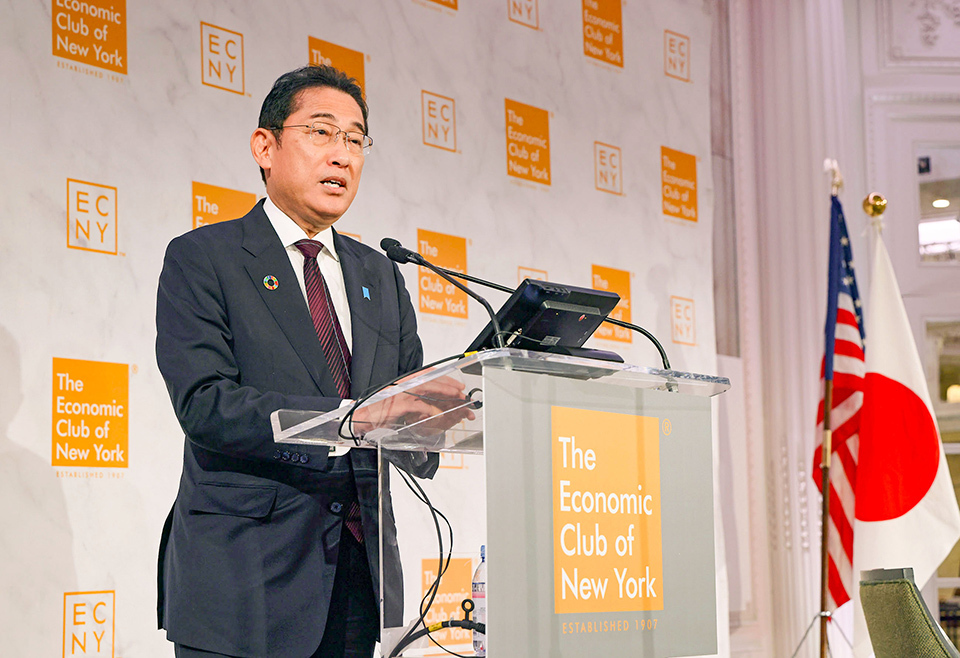Thanks to recent reforms aimed at helping Japan to become a leading asset management center—promoted by both the public and private sectors—the country’s markets are beginning to show signs of promise. What appeal do these markets hold, and what is their background, according to an expert in asset management who is active worldwide?

Interior of the Tokyo Stock Exchange. AFLO
In late February 2024, Japan’s stock market surpassed the record set at the peak of the bubble economy in 1989. Less than two weeks later, the Nikkei 225 index topped 40,000 for the first time, again grabbing global headlines. The high recorded on the final trading day of the 1980s was the product of an inflated asset bubble. However, according to David Semaya, executive chairman of Sumitomo Mitsui Trust Asset Management Co., Ltd., the current strength in Japanese equities is underpinned by robust fundamentals, and there are firm reasons to believe that the best is yet to come.
Semaya pointed out that one of the core factors influencing the current optimism about Japan’s markets is the most fundamental of fundamentals: well-run companies. Japan has promoted corporate governance reforms since the establishment of the Stewardship Code in 2014, and the Kishida administration is further encouraging these reforms through its Policy Plan for Promoting Japan as a Leading Asset Management Center. Still a work in progress, the increased focus on efficient use of capital and profitability should have positive influences. “I think we’re in a place now where we have a good balance between shareholder returns and stakeholder needs, demonstrating a very sustainable model,” Semaya said.

David Semaya, executive chairman of Sumitomo Mitsui Trust Asset Management, has been working in asset management in Japan since 1998.
Encouraging more talented fund managers to set up shop in Tokyo should not only boost returns for Japanese investors, but also add value across the domestic asset management value chain through the experience gained by local hires, according to Semaya. The sector has enormous potential in Japan, in no small part due to the prospect of enticing some of the vast pool of household savings into the country’s financial markets. Tapping into that to make Japan a leading asset management center is one of the aims of the current reforms. At the end of June 2023, total household assets stood at 2.1 quadrillion yen (around 14.3 trillion dollars). Approximately half of that is currently held in bank deposits, and even if a portion of that were to come into equities and other assets, it would further boost markets and the financial industry as a whole. The upgraded Nippon Individual Savings Account (NISA) tax exemption program for retail investors relaunched in January is designed to do exactly that.

“We will rectify Japan’s unique business practices and resolve barriers to entry, and will also introduce a new program to assist new entrants,” explained Prime Minister Kishida in September 2023 to leaders at the Economic Club of New York.
Semaya pointed to another factor in the Japanese economy’s favor: the recent arrival of rising salaries and healthy demand-pull inflation after decades mostly characterized by stagnation and a deflationary mindset that held back economic activity. “The increase in wages was significant overall on average last year. And this year, my understanding is that increases will also be significant in most sectors,” said Semaya. Higher wages are linked to maintaining healthy inflation, will stimulate the economy, and can contribute to the virtuous cycle of growth and distribution that Prime Minister Kishida vows to realize. In his policy speech in January 2024, he stated, “We aim to bring about a virtuous cycle in which household finances are reoriented towards investment and the increase in corporate value leads to greater household income, giving rise to further investment and consumption.”
Semaya believes that this may be one of those rare moments when nearly all the stars are aligned for Japan’s markets, something that is not going unnoticed overseas. “I get questions from investors abroad who have not previously followed Japan, such as: ‘What’s the best way to do our research so that we can potentially allocate capital there?’ I think these are very, very good signs. I haven’t heard this in 30 years.”





























